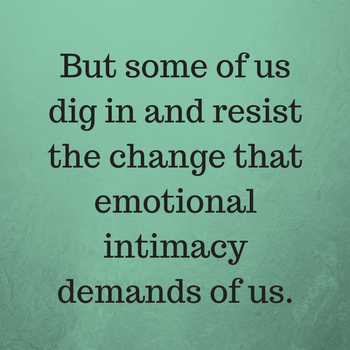Let the journey of self-discovery enrich your life...
This is the second article in the series Why Some Men Cheat.
During the painful aftermath of a marital affair (especially for couples who have decided to try to heal their marriage after infidelity), it’s common to hear the betrayed partner ask the person who had an affair, “Why? Why did you do it?” Baffled and wounded, they ask this question in earnest, desperate for an answer that might offer them some comfort or some glimpse into the future and whether or not the marriage will survive.
And quite often, the men on the receiving end of this question stare blankly, sometimes dismayed and confused by their own behavior. Some fall back on repeated apologies, feeling remorse over the hurt they caused their partners, but often at a loss for any kind of meaningful explanation.
The truth is, many don’t know why they’ve had an affair — or more accurately, they don’t know why they risked everything; why they broke a commitment that meant so much to them; why they engaged in something that could devastate their mate should it be discovered. They don’t know why they violated their own guiding principles. Attraction to another and being overcome by momentary passion do not adequately explain why someone would make such a profound decision with lasting consequences.
Below are two issues some men who have cheated have faced.
Why Some Men Cheat
Intimate relationships are often destabilizing
When love is new, the excitement to learn about the other and be known by her/him invites us to open ourselves to new experiences. We start to live a life of experimentation with the other. We are taken out of our comfort zone, we leave our default-self by entering into the new and exciting, the passionate and playful. In short, there is an openness and aliveness that wasn’t there prior to this person’s impact on us.
Change, even positive change, is disruptive. We simply cannot exist in passionate-overdrive for the rest of our lives. So it’s natural that we start to inch back to our previous self as our relationship matures. But despite this, some of us remain open to the impact of our partner; we continue to allow ourselves to be moved and challenged in ways that take us beyond the comfortable.
But some of us dig in and resist the change that emotional intimacy demands of us. When we move too far from ourselves, anxiety is stirred. Fear (which we may not be conscious of) arises when we leave the secure base of who we are, when we become too unrecognizable to ourselves. In these instances, discomfort replaces excitement (passive or active), resistance toward the other starts to enter the relational field.
In short, we must close ourselves off to the other—to his/her impact on us—if we are to get back to familiar ground, back to our typical likes/dislikes, back to the self that we’ve rested in for so long.
When this occurs, a relational status quo is set up, one threaded with spoken and unspoken rules of what kind of engagement is allowed, rules that create the grooves that may ground us and the relationship, but in doing so, may also risk smothering something important.
When the status quo is driven by anxiety (conscious or unconscious fears), self and relational vitality is muted — a lifelessness pervades the relationship and can make these men feel bored and trapped. In these instances, the lifelessness is attributed to the marriage/relationship rather than a closing off of oneself.
The paradox is that while fear keeps these men emotionally closed off to their spouse/partner, this same fear becomes a driving force to take risks with someone outside the marriage. In his book, Can Love Last (2000), the psychoanalyst Stephen Mitchell examines the unforeseen dangers that exist in long-term love, dangers that do not exist with those we are not fully committed to and do not deeply love. In short, it’s easier to take emotional risks with a potential affair partner than the person you’re committed to spending the rest of your life with.
How many of us truly surrender to our spouse/partner even when trust is strong and we believe they have our best interests in mind?
In my work with these men, the exploration of their family-of-origin dynamics and relationship history and attachment styles often sheds light on the underlying anxieties that may fuel these struggles.
Existential crisis
Some would argue that at some point in our life we will all experience an existential crisis. The limits and loss of vitality that come with aging, the tentativeness of existence, the reality of loss and grief are all painful experiences that we don’t easily court. We only deal with them when forced to.
You don’t have to be older to experience this kind of crisis (though age may be a factor for some). The loss of a loved one, an injury or illness, a near-death experience are some of the events that can trigger this profound psychological (and for some, spiritual) struggle — at the core of this struggle is a shattering of our world view.
 How we face (or run from) this crisis varies considerably.
How we face (or run from) this crisis varies considerably.
Infidelity is one pattern of flight from this type of emotional upheaval. Rather than turning inward and face our struggles or turn to our wives/partners for support, some men flee into the arms of another.
The novelty and rush from the affair-charge serves to blot out (at least momentarily) the confusion and pain that are inherent to this struggle. We may not be conscious of what we are chasing and what we are running from — all we know is that we somehow feel better (better = more alive, excited, less focused on our limits, failing bodies, responsibilities/concerns, etc.).
But when the initial charge of the affair relationship dwindles (which it inevitably does), and when escapism no longer works, our self-crisis comes back into sharp focus and a decision must be made: to face and work through these important issues or continue to chase the temporary rush that a new relationship may bring.
Under these conditions, an affair can take on an addictive quality, silencing underlying fears that we feel ill-equipped to deal with. But like any addiction, the so-called solution becomes our victimizer, one that may become more destructive than the initial problem it was intended to fix.
Boredom is one way this crisis presents itself. Here boredom covers up the real issue and boredom becomes the all-too-easy excuse to abandon ourselves in search of excitement. Of course there is nothing wrong with wanting an adventure, seeking something novel to excite us. But constantly running from boredom (rather than sitting with it and seeing what arises from it) and seeking excitement in ways that betray our values and our loved ones is clearly not the answer.
___________
It can be helpful to look at the larger context of your life in trying to understand infidelity. Some of the men I work with describe the particular conditions of their life situation as the coming together of several major stressors when they acted out and were unfaithful — the “perfect storm” that left them feeling vulnerable and lost, unmoored from the personal values they normally would protect. (And keep in mind the goal here is not to condone infidelity, but to try to understand it.)
In other words, try not to look for the one reason, the easiest explanation. Rather, look at the bigger picture, what made you vulnerable to acting out in this way, at this time in your life and at this time in your marriage/relationship.
So instead of looking for the single “why” of cheating, explore the different facets of your life at the present time and do an honest assessment of how you are handling your stressors and responsibilities, as well as the coping strategies you have in place to manage it all more effectively.
All best,
Rich Nicastro, Ph.D.
Dr. Nicastro is a psychologist in Austin & Georgetown, TX. He offers online counseling services for individuals and couples in Texas as well as other states.
(Featured image courtesy of Master isolated images at FreeDigitalPhotos.net)









